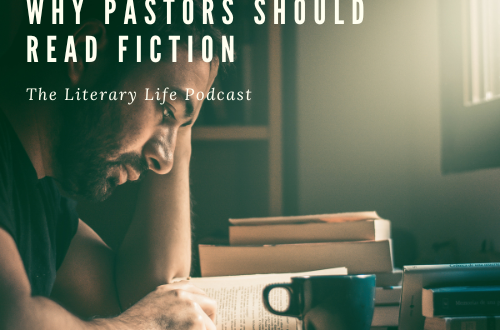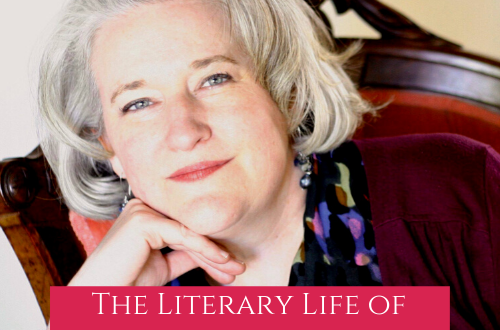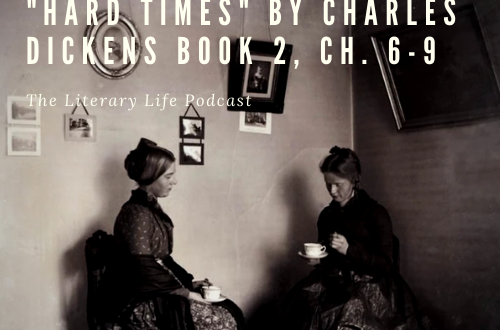
Episode 274: The Literary Life of Dr. Anne Phillips
This week on The Literary Life Podcast, our hosts Angelina Stanford and Thomas Banks are back with a new “Literary Life of…” interview, this time with their teaching colleague at House of Humane Letters, Dr. Anne Phillips. In addition to her classes at HHL, you can also find Dr. Phillips writing on Substack.
Angelina starts off the conversation asking Anne about her reading life growing up and her homeschool experience. She talks about how she came to love the Greek myths and started pursuing Latin. The three of them discuss how having a diet of truly good literature cultivates discernment in reading less valuable books. They also share thoughts on writing as imitation and the great importance of having good ideas over knowing particular forms. Anne also talks about her college and graduate school experiences and the challenges of being in academia in our current culture. They wrap up the conversation with a little look into what Dr. Phillips reading life looks like now as a working, homeschooling mother and wife.
To register for Dr. Phillips and Jenn Rogers’ upcoming mini-class, “The Great Divide”, please visit HouseofHumaneLetters.com.
Listen to The Literary Life:
Episodes Mentioned:
Why Translation Matters with Dr. Anne Phillips (Episode 188)
Gaudy Night Series (Episodes 4-8)
Commonplace Quotes:
Mr. Douglas is the kind of writer who hurls a pen where King Saul, in a similar manner, hurled a spear.
Robert Lynd
This conception of archetypes is based on the fact that literary education is possible, and that the understanding of individual works of art does expand into an understanding of literature as a whole. Individual works of art lose nothing of their individuality when we realize that they are not a series of bottled feelings, to be uncorked and re-smelt like perfumes. The person who has attained a mature understanding of literature, beyond both dilettantism and pedantry, understands it archetypically, whether he himself realizes this or not. I add this last clause because of certain features in modern literature that have, until very recently, discouraged critics from trying to understand it on the third level. One of these is the law of copyright, which prevents a writer from using another man’s work as the basis of his own, as Chaucer did. This, by exaggerating the uniqueness of the work of art, has developed a criticism of connoisseurship, which talks less about literature than about the pleasures of possessing books.
Northrop Frye, from “Levels of Meaning in Literature“
To learn Greek is, after all, a baptism into a noble cult.
Arthur Quiller-Couch
Telemachos Remembers
by Edwin Muir
Twenty year, every day,
The figures in the web she wove
Came and stood and went away.
Her fingers in their pitiless play
Beat downward as the shuttle drove.
Slowly, slowly did they come,
With horse and chariot, spear and bow,
Half-finished heroes sad and mum,
Came slowly to the shuttle's hum.
Time itself was not so slow.
And what at last was there to see?
A horse's head, a trunkless man,
Mere odds and ends about to be,
And the thin line of augury
Where through the web the shuttle ran.
How could she bear the mounting load,
Dare once again her ghosts to rouse?
Far away Odysseus trod
The treadmill of the turning road
That did not bring him to his house.
The weary loom, the weary loom,
The last grown sick from morn to night,
From year to year. The treadle's boom
Made a low thunder in the room.
The woven phantoms mazed her sight.
If she had pushed it to the end,
Followed the shuttle's cunning song
So far she had no though to rend
In time the web from end to end,
She would have worked a matchless wrong.
Instead, that jumble of heads and spears,
Forlorn scraps of her treasure trove.
I wet them with my childish tears
Not knowing she wove into her fears
Pride and fidelity and love.
From One Foot in Eden by Edwin Muir. Reproduced here solely for educational purposes.
Book List:
Amazon affiliate links included below
Anatomy of Criticism by Northrop Frye
The Well-Trained Mind by Susan Wise Bauer
The Illiad by Homer
The Odyssey by Homer
The Aeneid by Virgil
D’Aulaires’ Book of Greek Myths by Ingri and Edgar d’Aulaire
The Trumpet of the Swan by E. B. White
Stuart Little by E. B. White
Charlotte’s Web by E. B. White
The Secret Garden by Frances Hodgson Burnett
A Little Princess by Frances Hodgson Burnett
Grimm’s Fairy Tales by The Brothers Grimm
The Story of King Arthur and His Knights by Howard Pyle
The Magic Treehouse Series by Mary Pope Osborne
Trixie Belden Series by Julie Campbell and Kathryn Kenny
Ivanhoe by Sir Walter Scott
Harry Potter Series by J. K. Rowling
Howl’s Moving Castle by Diana Wynn Jones
Jane Eyre by Charlotte Brontë
Wuthering Heights by Emily Brontë
David Copperfield by Charles Dickens
Les Miserables by Victor Hugo
Beowulf by Anonymous, trans. by Burton Raffel
The Divine Comedy by Dante Alighieri
Bellum Catilinae by Sallust
Gaudy Night by Dorothy L. Sayers
The Chronicles of Brother Cadfael by Ellis Peters
Support The Literary Life:
Become a patron of The Literary Life podcast as part of the “Friends and Fellows Community” on Patreon, and get some amazing bonus content! Thanks for your support!
Connect with Us:
You can find Angelina Stanford and Thomas Banks at HouseofHumaneLetters.com, on Instagram @angelinastanford, and on Facebook at www.facebook.com/ANGStanford/
Follow The Literary Life on Instagram, and jump into our private Facebook group, The Literary Life Discussion Group, and let’s get the book talk going! http://bit.ly/literarylifeFB
Subscribe to The Lit Life:








